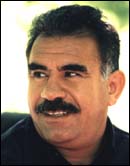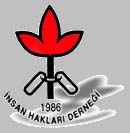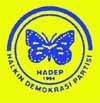4
October 2002
![]()
1. "Turkey commutes death penalty on Kurdish leader Ocalan", Kurdish rebel leader Abdullah Ocalan on Thursday escaped the gallows, but was set to spend the rest of his life behind bars after a Turkish court commuted his death sentence to life imprisonment.
2. "Torture, rights violations persist in EU-hopeful Turkey, rights group says", torture and other forms of human rights violations are still widespread in Turkey, a country seeking to join the European Union, the main local human rights' watchdog said here Thursday. The charge came in a report by the Turkish Human Rights Association (IHD) detailing rights abuses in the first six months of this year and released at a press conference here.
3. "EU to Recommend 10 to Join; No Date for Turkey", the European Commission ( news - web sites) will recommend next week that 10 candidate countries should join the European Union ( news - web sites) in 2004 but will propose no date for Turkey to start accession talks, an EU source said Friday.
4. "Case against pro-Kurdish HADEP to be resolved soon", it is now up to the head of the Constitutional Court to set the date for the final ruling over the fate of HADEP.
5. "UN Cyprus talks open clouded by Turkish elections", diplomats said a breakthrough was unlikely but the talks could lay the groundwork for a settlement after Turkey's Nov. 3 general elections but before Dec. 12, when EU leaders gather in Copenhagen to make decisions on new members to accept in 2004.
6. "Kurdish factions mark growing accord by recalling parliament", Kurds make further efforts to end their divisions.
1. - AFP - "Turkey commutes death penalty on Kurdish leader Ocalan":
ANKARA / 3 October 2002 / by Hande Culpan
Kurdish rebel leader Abdullah Ocalan on Thursday escaped the gallows,
but was set to spend the rest of his life behind bars after a Turkish
court commuted his death sentence to life imprisonment. The ruling by
the Ankara state security court followed the adoption in August by parliament
of a set of far-reaching human rights reforms aimed at drawing the country
closer to the European Union (EU). The court decided unanimously that
Ocalan, the leader of the outlawed Kurdistan Workers' Party (PKK), would
stay in prison until his death and would have no chance of an amnesty.
The ruling was to be conveyed to the 54-year-old rebel leader at Imrali prison island, in northwestern Turkey, where he is being kept in solitary confinement. Ocalan, long considered by Turkey as its public enemy number one, dodged authorities for years, hiding in Syria, until October 1998 when Turkey threatened military action against its southern neighbour if it did not turn him in. He was captured by undercover agents in Kenya, in February 1999, while trying to find another country which would agree to shelter him. Turkey sentenced him to death in June 1999 for treason because of the PKK's armed campaign for Kurdish self-rule in the mainly Kurdish-populated southeast of the country.
Heeding an appeal by the European Court of Human Rights, Ankara suspended Ocalan's execution until the court ruled on his complaints against Turkey. But his fate remains highly controversial in a country which has been traumatized by the loss of more than 36,000 lives -- most of them PKK rebels -- in the bloody conflict. Parliament's decision to scrap capital punishment -- in peace time -- was welcomed by his family, but condemned by relatives of soldiers slain in fighting with his rebels, who took to the streets in anger. The Nationalist Action Party (MHP), the far-right partner in the ruling government coalition, was also unhappy with the change and had called on the country's top court to scrap the reform.
The party, which had earlier tried to block the reform in parliament, wants to see Ocalan hanged -- a long-standing promise to its constituency. Liberal mainstream parties, for their part, have argued that executing Ocalan would make a martyr of him and dash Turkey's hopes of ever joining the European Union. The PKK leader is widely respected among Kurds: his capture had triggered mass demonstrations and hunger strikes by supporters, both in Turkey and at home. Following his arrest, he urged peace between Turkey and his rebels, which prompted the PKK to end its armed campaign in September 1999 and withdraw from Turkish territory to seek a democratic resolution to the problem.
The PKK unilateral truce brought an end to heavy fighting in the country's southeast, but has been dismissed by Turkey's powerful army which has called on the rebels to either surrender or face its wrath. The PKK recently changed its name to KADEK, or Congress for freedom and democracy in Kurdistan.
EU hails Turkish decision to commute Kurdish leader's death sentence
The European commissioner in charge of EU enlargement, Guenter Verheugen, on Thursday welcomed Turkey's decision to commute to life imprisonment a death sentence imposed on Kurdish leader Abdullah Ocalan.
"I welcome this decision, which is clearly in line with the spirit of the recently adopted reforms in Turkey", said Verheugen in a brief statement. Commuting the sentence against Ocalan, who is the leader of the outlawed Kurdistan Workers' Party (PKK), the Ankara state security court ruled that he would spend the rest of his life in prison with no chance of an amnesty.
Ankara made the decision to commute Ocalan's sentence
as part of political reforms aimed at boosting Turkey's chances of one
day becoming a member of the European Union. Turkey, which is not among
the 10 countries currently expecting to be admitted to the EU in 2004,
has been demanding that the EU set a date for the beginning of accession
talks. ![]()
2. - AFP - "Torture, rights violations persist in EU-hopeful Turkey, rights group says":
ANKARA / 3 October 2002
Torture and other forms of human rights violations are still widespread
in Turkey, a country seeking to join the European Union, the main local
human rights' watchdog said here Thursday. The charge came in a report
by the Turkish Human Rights Association (IHD) detailing rights abuses
in the first six months of this year and released at a press conference
here.
According to the report, 381 people reported being subjected to torture and maltreatment between January and June, compared to 862 for the same period last year. "The figures for 2002 show that at least two people were tortured daily in Turkey," IHD chairman Husnu Ondul said. "Despite various legal amendments and measures taken by authorities, torture continues unchanged," he added. "This is a challenge to human rights and democracy". The report also cited a significant rise in the number of people prosecuted for expressing their views -- 2,260 in the first six months of the year. The number for last year was 3,473.
The organization also slammed authorities for their apparent indifference to a long-running hunger strike by left-wing prisoners to protest against detention conditions in maximum security jails. The strike has claimed 57 lives so far. The watchdog also said restrictive security measures remained in place in the country's mainly Kurdish-populated southeastern corner, where armed rebels waged a 15-year armed campaing for Kurdish self-rule. The IHD's report was published just ahead of a report by the European Commission on Turkey's progress towards meeting conditions for becoming an EU member.
Turkey wants the pan-European bloc to set a date for the
opening of accession talks before the end of the year after its parliament
adopted far-reaching pro-democracy reforms in August. These included
the abolition of the death penalty and expanded cultural rights for
the Kurdish minority. The IHD on Thursday welcomed these reforms, but
said Turkey needed to take many more steps before it could claim to
be democratic. "Turkey is not a democratic country. It is authoritarian,
and sometimes, totalitarian," Ondul said. ![]()
3. - Reuters - "EU to Recommend 10 to Join; No Date for Turkey":
BRUSSELS / 4 October 2002
The European Commission ( news - web sites) will recommend next
week that 10 candidate countries should join the European Union ( news
- web sites) in 2004 but will propose no date for Turkey to start accession
talks, an EU source said Friday.
The 10 are Poland, Hungary, the Czech Republic, Slovakia, Lithuania, Latvia, Estonia, Slovenia, Cyprus and Malta. The EU executive will propose a target date of 2007 for Romania and Bulgaria to join the bloc, the source said.
He said the Commission's regular report on the aspirants, due out next Wednesday, would call for strict monitoring of candidates' implementation of EU law after entry negotiations are concluded in December and the treaty is signed next April.
The Commission will seek the power to impose safeguard measures to protect the markets of member states in the first two or three years of membership if accession distorts the EU's internal market for some products, the source said.
Despite strong U.S. pressure, the Commission would not recommend giving Turkey a date for starting entry negotiations because it still met neither the economic nor the human rights criteria but it would offer Ankara more aid, the source said.
He said the report would make no distinction between Cyprus
and the other front-ranking candidates despite the absence of a peace
accord to reunite the divided east Mediterranean island. ![]()
4. - NTV / MSNBC - "Case against pro-Kurdish HADEP to be resolved soon":
It is now up to the head of the Constitutional Court to set the date for the final ruling over the fate of HADEP.
3 October 2002
he fate of the pro-Kurdish Peoples’ Democracy Party (HADEP),
which is the subject of a court case in the Constitutional Court, is
to be settled soon after further submissions were made by the Chief
Prosecutor at the court’s request.
The Chief Prosecutor Sabih Kanadoglu provided the Constitutional Court with the additional information it had requested in the case he had launched against HADEP, seeking its closure on the grounds that it supported separatism. The Constitutional Court had earlier issued a ruling seeking the further information from the chief prosecutor, which was delivered at the end of September.
An expert is to review Kanadoglu’s supplementary
report, including the additional information. After this process is
completed it is up to the Chief Justice of the court to set a date for
the final hearing in the case and the verdict. ![]()
5. - Reuters - "UN Cyprus talks open clouded by Turkish elections":
Diplomats said a breakthrough was unlikely but the talks could lay the groundwork for a settlement after Turkey's Nov. 3 general elections but before Dec. 12, when EU leaders gather in Copenhagen to make decisions on new members to accept in 2004.
United Nations / 4 October 2002
U.N. Secretary-General Kofi Annan begins two days of talks with
the leaders of divided Cyprus on Thursday in hopes of progress toward
a last-minute deal to reunite the Mediterranean island before the European
Union decides to invite it to join the bloc.
Diplomats said a breakthrough was unlikely but the talks could lay the groundwork for a settlement after Turkey's Nov. 3 general elections but before Dec. 12, when EU leaders gather in Copenhagen to make decisions on new members to accept in 2004.
"I think the international community is resigned to no movement until after the Turkish elections," said one diplomat close to the talks, speaking on condition of anonymity.
Cypriot Foreign Minister Ioannis Cassoulides said at the United Nations last month that he saw Dec. 12 as "the closing of the window of opportunity" for the talks to succeed.
Failing a deal, the two sides could aim for an interim, or broad outline agreement, diplomats say.
Annan plans to start out the New York talks by meeting separately with Turkish Cypriot leader Rauf Denktas and Greek Cypriot leader Glafcos Clerides then inviting both men to a working lunch.
The leaders have been holding U.N.-backed reunification talks all year but have failed to make progress despite an initial June deadline. The U.N. Security Council has chided the Turkish Cypriot side for rigidity in the talks.
Clerides and Denktas agreed to the New York negotiations during a meeting with Annan in Paris on Sept. 6.
In search of a way forward
"It is about a month, and I would want to review with them what has happened since then, and how we move forward as we get to the end of the year," Annan said on Wednesday when asked what he expected out of the New York meetings.
Reluctant to get embroiled in Turkish politics in the run-up to the Nov. 3 elections, Annan has put off for now a plan to put his own draft peace plan on the table, diplomats said. They said the plan would likely be presented in mid-November.
The U.N. leader this week left open the possibility the talks could go beyond December. "If by the time of accession the issues have not been resolved, I expect the talks to continue beyond the EU accession," he said in New York.
But if there is no agreement before the Copenhagen summit and a divided Cyprus is asked to join the 15-nation EU, Turkey has warned it may "annex" the northern part of the island, effectively wrecking its own hopes of EU membership.
Cyprus, with a population of about 750,000 people and a land area smaller than the U.S. state of Connecticut, has been divided since 1974.
All efforts to resolve the dispute -- a constant source of tension between NATO allies Greece and Turkey -- have failed.
At issue are two fundamentally different visions of a reunited island.
Greek Cypriots want one state comprising two ethnic regions, while Turkish Cypriots want a union of two largely independent states in a new confederation which would replace the existing internationally recognized Republic of Cyprus.
While Denktas does not recognize Clerides as the president
of the entire island, the Turkish Cypriot state that he heads is recognized
only by Turkey. ![]()
6. - The Guardian - "Kurdish factions mark growing accord by recalling parliament":
Kurds make further efforts to end their divisions
4 October 2002 / by Michael Howard
The Kurdish regional parliament will meet in Irbil today for the
first time for six years, as a further step towards reuniting its people
in the self-rule area of northern Iraq and helping to counter the inter
national community's fear that the opposition to Saddam Hussein is hopelessly
divided.
The 105-member asembly which first met on October 4 1992 has not been convened since the region was divided by fighting between the Kurdistan Democratic party and the Patriotic Union of Kurdistan in the mid 1990s.
The Foreign Office said that Britain "welcomed any move that shows a commitment to building peace and stability in Iraq."
Washington, which regards the region's 3.5 million Kurds as key allies against President Saddam, has been pressing the KDP leader, Massoud Barzani, and the PUK leader, Jalal Talabani, to advance their 1998 peace agreement, which it helped to bring about.
The agreement requires elections within nine months, and many Kurds hope the ballot leads to the reunification of two governments.
The pace of raprochement between the two parties, which are divided on issues such as sharing trade revenues from Turkey and the price of electricity from a dam in PUK territory, has increased since Kurdish leaders met US officials in Washington in June.
They have agreed on a draft constitution for a future federal republic of Iraq in which the Kurds would control their own region,and set up joint committees to work on secu rity issues and the restoration of normal relations.
They are to relax bars on the movement of one another's officials and address the problem of restoring property seized during the internal conflict.
The draft will be debated by Kurdish MPs today. It has
alarmed Ankara, which fears anything likely to encourage its own Kurdish
population's wish for independence. But the Iraqi Kurds have been at
pains to point out that they are not asking for independence, and that
they will respect Iraq's territorial integrity. ![]()